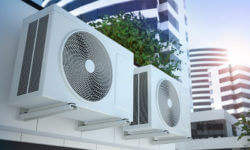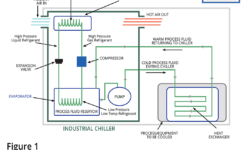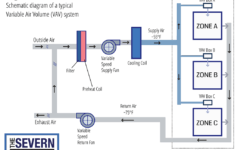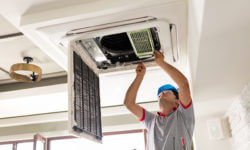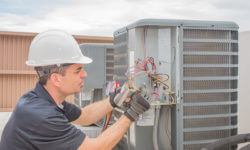When choosing which HVAC system to install, it can be difficult to navigate your options. There are too many systems on the market to count. However, understanding the four major types of commercial air conditioning units may help you make an informed decision. We break down each of them below.
Read more →Owners of R-22 cooling systems in the United States will soon have to make some changes. On January 1, 2020, the production and import of R-22 refrigerant will become illegal. This is going into effect to further protect the environment and the ozone layer. But, what does this mean for your HVAC system? And what will your options be? Here’s an overview of what you should know.
Read more →Chillers do exactly what the name says – cool things down. In fact, chillers are necessary across a wide range of applications. But, how does a chiller work? In short, they prevent overheating and keep products cool to avoid harm to your machinery and bottom line. Here, we’ve broken down the elements of chillers and how they work.
Read more →Trying to decide which air zone HVAC system is right for you? There are two types to consider: VAV (variable air volume) and VVT (variable volume and temperature) HVAC systems. Overall, both systems help you cut back on utility costs compared to CAV (constant air volume) systems of years past. However, there are a few key differences that could sway your decision. To help you get a better idea, we’ve compared VAV vs VVT systems.
Read more →Cooling capacity is measured in BTUs (British Thermal Units) just like it is for grills and ovens. The number of BTUs lets you know how much heat the unit can manage. It takes a lot of planning and calculation to figure out the correct size for buildings, especially large multi-stories. So, let’s dive into some things you need to know about properly sizing a commercial air conditioner.
Read more →Room temperature is always a hot topic in the office. No matter what you set the workplace thermostat to, it can seem impossible to please everyone. Someone is always too hot or too cold. Even so, it’s very important to get it right, because research shows that temperature has serious effects on work performance. Turns out, it’s far more than just a comfort issue. So, what is the optimal workplace temperature? Let’s dive into the science to find out.
Read more →In most cases, commercial HVAC systems simply provide comfort. However, healthcare facilities demand much more out of their HVAC. In fact, modern hospitals can’t function without a working HVAC system. Why? Because they help keep doctors and patients healthy and safe. Therefore, it’s very important to have a team of HVAC professionals who understand the unique needs of a hospital. And, this is not something every commercial HVAC contractor is familiar with.
Read more →If you’re in the market for a new commercial HVAC unit, you’ve likely come across dozens of HVAC acronyms. Just like any other line of work, the HVAC industry uses hundreds of acronyms. And, sometimes this can make shopping for a new unit confusing. But, have no fear – we’re here to help by decoding 10 common HVAC acronyms.
Read more →Believe it or not, summer is just around the corner. That means it’s the perfect time to perform some preventative maintenance to get your HVAC system ready for warmer weather. Need a reminder of what springtime HVAC maintenance entails? Here are some commercial HVAC prep tips to get you started.
Read more →At The Severn Group, we see a lot of commercial HVAC problems. Businesses all throughout Maryland and the Washington metro areas call on us to maintain and service their systems. As such, our team has seen it all, from the minor problems to the major ones. Here are some of the most common issues that facility and operations managers may run into.
Read more →